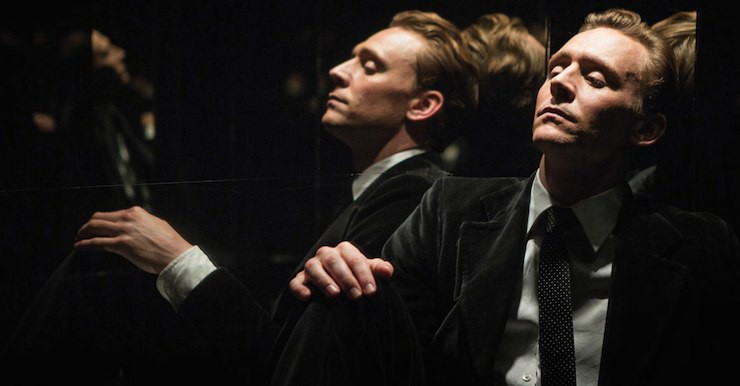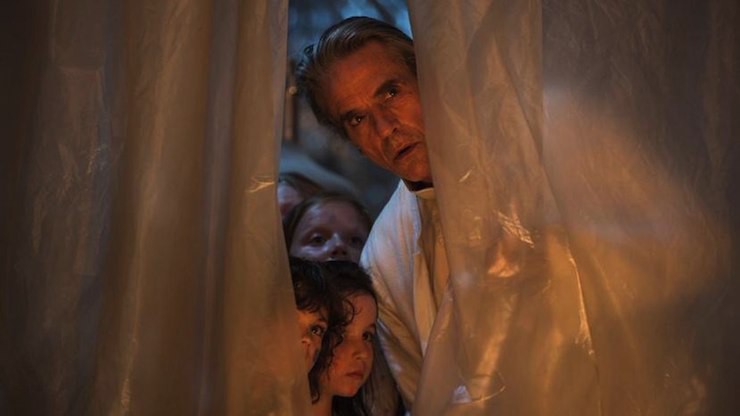I was predisposed to like High-Rise, given my admiration for J.G. Ballard’s fiction and Ben Wheatley’s films. Wheatley is a Fantastic Fest favorite; his previous films Down Terrace, Kill List, Sightseers, and A Field in England all had their US premieres there in previous years, so it’s no surprise that High-Rise was one of the hot tickets for this year’s festival.
Advance word out of TIFF was fairly polarized, and reactions at Fantastic Fest were similarly split. High-Rise is not to all tastes. Overly literal minds will spend too much time wondering why Laing doesn’t just leave the high-rise and go to Tesco instead of doing the notorious thing that he does for food in the opening scene. Some may be slightly disappointed by the fact that it is what they envisioned when they heard “Ben Wheatley is directing an adaptation of High-Rise” and thus lacks some surprise. However, the film largely succeeds—Ben Wheatley and screenwriter/co-editor Amy Jump have created a visually striking, splendidly acted adaptation that accurately captures the sardonic humour and the gimlet observations of human behaviour of Ballard’s novel.
In discussing Ballard, references are often made to his “prescience,” and High-Rise is sometimes described as a “warning”—stumbling into the annoying trap of evaluating science fiction by the degree to which it “predicts” the future. If anything, High-Rise is a still-relevant satire in which Ballard was exaggerating ad absurdum social currents already extant in 1970s Britain.
The story, for those unfamiliar: the year is 1976; pathologist Robert Laing moves into a brand-new forty-story high-rise apartment building. His flat is on the twenty-fifth floor, in a zone inhabited by other middle-class professionals—dentists, accountants, psychologists, and the like. Above are jewellers, tax accountants, celebrities, and the designer of the high-rise himself, architect Anthony Royal. Below are artists, TV studio technicians, grocery store clerks, and housekeepers to the upper floors. Families with children—”the real ones,” one resident says—also occupy the lower floors.
Royal’s high-rise is a modernist experiment: an attempt to draw people from all walks of life into a purpose-created building with equal access to resources. The building is one of a proposed five, part of a master-planned complex that Laing thinks resembles “the unconscious diagram of some sort of psychic event.” It’s reminiscent of the Barbican, a complex of high-rise towers and low-rise apartment blocks arranged around a center that includes an arts venue, a museum, a plant conservatory, an exclusive school, and one of the oldest churches in London. The actual Barbican may be one of the most Ballardian locations in the world, and it almost certainly inspired the production design in Wheatley’s film.
Royal’s grand plans notwithstanding, the high-rise residents quickly organize according to the familiar social hierarchy emphasized by their home floors, and a kind of small-town curtain-twitching interferes with the supposed anonymity of high-rise life. There are acts of petty spite and discontent. After a power outage (accompanied in the film by a children’s birthday party that goes anarchically out of hand, disrupting a private party at the community swimming pool), relations escalate into literal class warfare. The parties that happen nearly nightly turn into battles. The residents of the lower floors ambush the residents above and torment or kill anyone they catch; the upper-story residents plan to “balkanize” the lower floors. Conditions decay ferociously; soon the inhabitants are living in warring hunter-gatherer tribes, surrounded by heaps of their own garbage.
The most successful people are those like Laing—”the self-contained types like you, thriving like an advanced species in the neutral atmosphere.” Early in his residency, Laing admits to having trouble “slotting in,” and he tries to negotiate a position: first within his own stratum; then amongst the inhabitants of the upper floors, who reject him harshly, despite Royal having claimed him as a regular squash partner; and then amid those of the lower floors, in whose insurrection he is not quite comfortable participating. By the end, he has finally found his place. Early on in the film, he calls in sick to work and tells his secretary that “I don’t need anything; it’s all here.” Truer words and all that.
Ballard’s work has twice been adapted to film—Crash by David Cronenberg, and Empire of the Sun by Steven Spielberg. Both directors found in their chosen Ballard novels the material to feed their own cinematic styles and obsessions—Spielberg tells a boy’s coming-of-age story, and Cronenberg turns his dispassionate eye on one of the most brutal intersections between technology and the human body. High-Rise in turn dovetails perfectly with Wheatley’s hallucinatory style and pitch-dark sense of humor. His camera, unlike Cronenberg’s, is intimately involved with the characters, jittering and shaking with them, crashing on the floor when they fight. He does encounter a problem inherent to screen depictions of debauchery and degeneracy—often, the act of depiction diminishes the scene, which can’t match the images the reader might have in their mind. However, Wheatley generally manages to suggest more than he depicts (and he depicts quite a lot), and his florid, exaggerated visuals are a surprisingly good match for Ballard’s deadpan satire.
There are times when Wheatley goes just a little too far. A scene at Laing’s teaching hospital where he strips the flesh from a skull signals too sharply the sublimated violence beneath the high-rise’s banal gloss. Royal’s wife throws a party where the guests are kitted out as 18th-century French aristocrats, upper-class decadents plainly ready for some kind of guillotine. In the novel, the reason for the first death in the high-rise is unknown; whether suicide, homicide, or accident, the point is that no one cares. The film departs significantly by making that death the indirect result of an act of spiteful revenge on Laing’s part. Such moments are bit too on-the-nose—but then again, the source is already about as subtle as a half-brick in a sock; witness the names Anthony Royal and Richard Wilder for two men on opposite ends of the social ladder. Laing himself shares a name with controversial psychologist R.D. Laing, among whose theories is the idea that mental illnesses, such as psychosis, were in part a reaction to the stresses caused by the conflicting demands of society and family.
Laing is perfectly embodied by Tom Hiddleston, whose good looks and physical grace have always had something louche and ophidian about them. His performance as Loki often deployed those qualities to the point of self-parody; here he is subtler and more restrained. He cultivates a careful exterior blandness, constantly mouthing platitudes about how everything will surely be fine—the power will be restored, and all will return to normal soon enough—even as he fluidly adapts to the chaos around him.
His restraint almost allows his co-stars to steal the show. Richard Wilder (Luke Evans) starts brash and lively, and devolves to a point where he speaks mostly in guttural growls, rapes “people he isn’t supposed to” (says one outraged upper-floors man), and eats dog food with relish. Jeremy Irons—who has apparently scarcely aged at all since Dead Ringers—plays Anthony Royal with a touch of arch camp, swanning about in his increasingly bloodstained white safari jacket and brandishing a chrome walking-stick.
Wheatley and Jump notably give more time to the women of the high-rise than they are afforded in the novel. Laing’s neighbor and occasional fling Charlotte Melville (Sienna Miller) gains greater significance as someone whose membership on “all sorts of committees” and contacts through all levels of the high-rise make her a sharp-eyed observer and commentator. Wilder’s wife Helen (an underutilized but still marvelous Elisabeth Moss) is sharper of tongue and less frustratingly passive, and Royal’s wife Ann (Keeley Hawes) and actress Jane Sheridan (Sienna Guillory) create an unsettling double-act made more unnerving by their physical similarity. Initially, the men treat them as possessions, sexual playthings, and bargaining chips, but as time passes, the women draw together in bands for mutual protection, apparently even in defiance of the class lines ferociously defended by the men; they tend to Charlotte after she’s been brutalized by Wilder, for instance, and in the final act they avenge themselves on one of their tormentors with many sharp knives. Suggestively, one of the most significant visuals is the presence in Royal’s penthouse of Goya’s Witches’ Sabbath.
That coalition of women that forms as the men tear each other apart strikes the closest thing to any kind of “uplifting” note in High-Rise. As the film closes, lights begin to fail in the next high-rise over, and Charlotte’s son sits on the roof, listening to a radio broadcast of (not yet Prime Minister) Margaret Thatcher declaring that “There is only one economic system in the world, and that is capitalism.” The microcosm within the high-rise suggests that she may have had a point—perhaps humans have an innate drive toward capitalist exploitation and hierarchy that even the best-intentioned plans cannot defeat, particularly when people have been conditioned from birth to find their “slot.” However, Wheatley’s film is as resistant to tidy interpretation as Ballard’s original novel, and like the novel, it goes to artistic extremes to call attention to aspects of human nature that the viewer may not want to see.
Karin Kross lives and writes in Austin, TX. She’ll be writing up the rest of her Fantastic Fest experience at hangingfire.net. She may be found elsewhere on Tumblr and Twitter.












